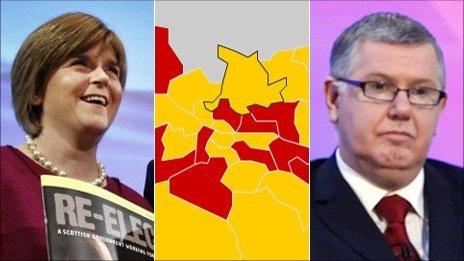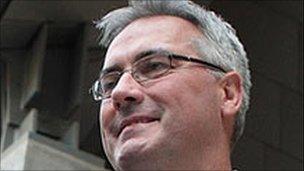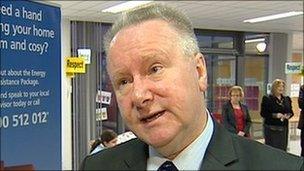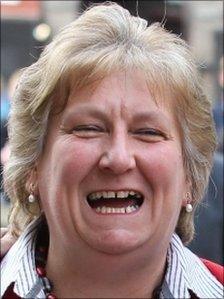Scottish Election: Labour crashes in Scottish heartland
- Published

Nicola Sturgeon won Glasgow Southside as the SNP blazed a trail through Labour's west of Scotland stronghold, displacing, among others, Andy Kerr
When Labour lost the keys to its Scottish citadel in 2007 it had the consolation of knowing its west of Scotland power base had stood firm.
Four years on, after voters delivered an SNP landslide, the party does not even have that crumb of comfort.
In the 2011 Scottish election, Labour was humiliated in its own back yard.
Some of its most senior figures are political corpses - cut down in a previously impregnable heartland that now resembles Labour's Little Big Horn.
The SNP will rightly claim all the national headlines for a stunning night of success, which surely surpassed even the wildest hopes of their most optimistic supporters.
Labour casualties
It is in the west of Scotland, however, that the sheer scale of the victory can be gauged by counting Labour scalps taken against all expectations.
The list of casualties for Labour is shocking, and will deprive the party of some of its most experienced and sure-footed performers for the lifetime of the parliament.
In Glasgow, the city's Shettleston, Cathcart, Southside, Kelvin and Anniesland constituencies were all taken by the Nationalists with swings of between four and 12% from Labour.

Labour's Frank McAveety lost out in Glasgow Shettleston
The SNP's John Mason defeated former Labour minister Frank McAveety in Glasgow Shettleston.
Another shock saw the Nationalists' James Dornan take the city's Cathcart constituency, ousting Charlie Gordon - a former city council leader.
The SNP's Sandra White triumphed in the Kelvin constituency over Labour's Pauline McNeil.
In the newly created Glasgow Southside constituency, SNP deputy leader Nicola Sturgeon overcame a slim notional Labour majority to defeat Stephen Curran.
Bill Kidd also defeated Labour's Bill Butler in Glasgow Anniesland by just seven votes following a prolonged recount.
When these victories are viewed on a political map, a swathe of SNP yellow cuts through Labour's previously rock-solid red heartland, linking with other gains in surrounding areas.
Leadership hopeful
In Lanarkshire, Dunbartonshire and Ayrshire, there was more jubilation for the Nationalists at the expense of Labour.
Andy Kerr, a potential leadership hopeful who held the health and finance portfolios for Labour in a previous administration, was defeated in East Kilbride by the SNP's Linda Fabiani.
His former ministerial colleague, Tom McCabe, was ousted in Hamilton, Larkhall and Stonehouse by the Nationalists' Christina McKelvie.
Neighbouring Clydesdale fell to the SNP, as did Airdrie and Shotts, where Alex Neil defeated Karen Whitefield.

Alex Neil took Airdrie and Shotts for the SNP
The SNP's Jamie Hepburn took Cumbernauld and Kilsyth from Labour's Cathie Craigie.
In Strathkelvin and Bearsden and Clydebank and Milngavie, other Labour stalwarts, David Whitton and Des McNulty, wilted under the challenge of the SNP's Fiona McLeod and Gil Paterson.
The red dominoes also fell in Renfrewshire North and West, Paisley, and in Cunninghame South, where the SNP's Margaret Burgess defeated Irene Oldfather.
The SNP took Carrick, Cumnock and Doon Valley, where Adam Ingram beat Richard Leonard.
All over the west of Scotland it was a night of devastation for Labour as it lost key seat after seat to a rampant SNP.
Amidst this political deluge, there was little to cheer the other parties.
The Conservative's John Scott held Ayr, but the party's hopes of taking Eastwood in East Renfrewshire were dashed when Labour's Ken Macintosh held off a strong challenge from Jackson Carlaw.
National collapse
Party leader Annabel Goldie was returned on the West of Scotland regional list along with Mr Carlaw.
They will be accompanied to Holyrood by Ruth Davidson, who was elected on the Glasgow regional list.
For the Liberal Democrats, their worst fears were realised as the party suffered a national collapse.
Former minister Ross Finnie is out of Holyrood after his party failed to return any candidates on the West of Scotland list. The Glasgow list did not offer any succour either.

Scottish Conservative leader Annabel Goldie was returned to Holyrood
The UK coalition partners are now only represented at council level in the west of Scotland and must be fearing a similar hiding when they face voters in those elections.
There was some joy for the Greens, when convener Patrick Harvie was returned on the Glasgow list.
With some other regional lists still to declare, the party is hoping to add to its previous total of two MSPs at Holyrood.
For other minor parties - and big names - the list results were nothing to shout about.
The outspoken former Labour MP George Galloway failed in his attempt to re-enter frontline politics when he could not muster enough support on an anti-cuts coalition ticket in Glasgow.
The Scottish Socialist Party and its breakaway sibling, Solidarity, also failed to make a breakthrough.
So, where does this leave politics in Scotland - and the west of Scotland?
Nationally, the SNP has steamrollered the opposition on its way to an unprecedented overall majority.
That seemed unthinkable under the Holyrood election system, so, it is hard to conclude other than that it may have changed Scottish politics forever.
If Labour's traditional Glasgow and west of Scotland heartlands are no longer a sure thing, the dynamic of future elections could be changed completely.
For the SNP, that represents a massive opportunity to expand its power base and undermine its biggest rival permanently.
Where Labour goes from here - having seen its Scottish fortress breached and then completely over-run in the last four years - is a question its activists, strategists and MSPs will have to ponder long and hard during five wilderness years of opposition.
- Published6 May 2011
- Published6 May 2011
- Published6 May 2011
- Published6 May 2011